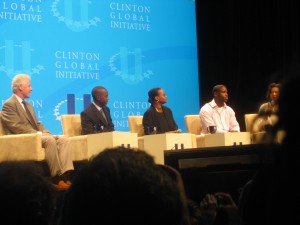Clinton Global Initiative University brings college students together to discuss the problems plaguing the modern world. This year’s conference was April 16-18 at the University of Miami.
The closing panel of the conference addressed the continuing problems in Haiti. Michele Norris, of NPR’s All Things Considered, presided over discussion of the sensitive situation in Haiti after the earthquake.
Three panelists were Haitian, including an author, a football player, and a student. Former President Bill Clinton joined them. He has played a major role in efforts to provide aid since the earthquake.
Clinton was named special envoy to Haiti last year, and he and fellow former President George W. Bush are spearheading humanitarian relief efforts through the Clinton Bush Haiti Fund.
Norris adopted the adage “grace in the rubble” as a theme for the panelists to discuss in relation to the ongoing efforts in Haiti. She focused on the positives coming out of such a crippling situation.
Clinton said his ideas about revitalizing Third World countries now differ from those he had when he was president.
He acknowledged he was wrong in his earlier assumptions that helping the Third World meant industrializing the countries. Now, he says, developing agriculture and helping a country become self-sufficient fixes the root of the problem.
For example, Haiti imports one million eggs a day, a product that could easily be produced in-country. Clinton’s goal is to help Haiti focus on such self-support methods.
Stanley Clermont, a Haitian student who experienced the earthquake, reluctantly shared his story from the day of the earthquake with the crowd of about 1,500.
“It was the most terrifying day, but also the best day,” Clermont said. “This is that day that God personally talked to me. [God said] I chose you to witness everything I did for you… use everything I gave you as a gift to help all the other people around you.”
Clinton supported Clermont’s statement on the importance of education. Clermont said he was blessed with a scholarship that enabled him to go back and work in his home country. One of Clinton’s focuses in Haiti is to rebuild the education system, building an economic system that can support and use the talent and skills of its citizens.
Edwidge Danitcat, an acclaimed Haitian author, spoke of the opportunity the Haitians have because of the disaster.
“It was an opportunity to show what Haitians can do,” Danitcat said. “[It was] a lesson in who we really are.”
The Haitians have a chance to rebuild human potential, Danitcat said. “We engage in our problems, even as they worsen.”
Clinton stressed the importance of peole and agencies, other than governments, in dealing with the situations like that in Haiti. The interdependence of the world will only become more intertwined, and we must take an active role in the world in which we live, he said.
“In every adversity, there is a choice to be made,” Clinton said.
Michele Norris ended the discussion with an empty bowl. She asked each panel member to explain what that meant to him or her for Haiti.
Each Haitian filled the bowl with things the Haitian people can do to recover from the earthquake.
Clinton turned that into an opportunity to restate his theme. “They can fill their own bowls if we do this right,” Clinton said.

From left to right: Bill Clinton, Stanley Clermont, Edwidge Danticat, Pierre Garçon, and Michele Norris
-Part 1- Watch Stanley Clermont tell his story of the day of the earthquake in Haiti.
-Part 2- Watch Stanley Clermont tell his story of the day of the earthquake in Haiti.
Indianapolis Colts Wide Receiver Pierre Garçon explains his Haiti Relief Foundation.

